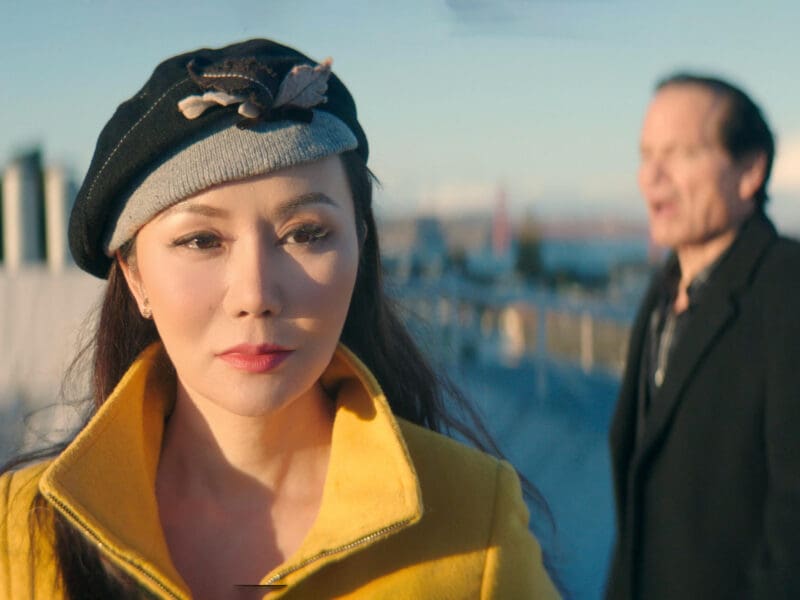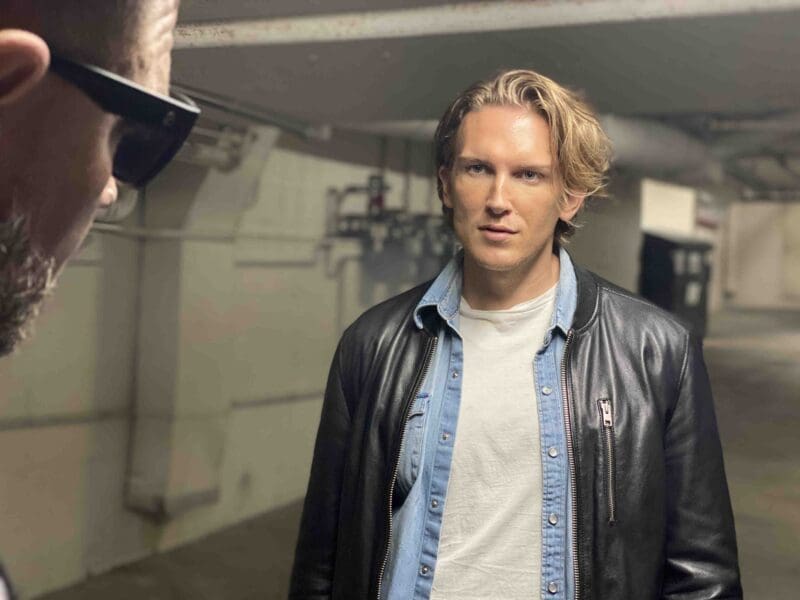
Go ‘Beneath’ with Gene Fallaize
Gene Fallaize is a British film & television director and screenwriter. The talented creative also helms production company Cupsogue Pictures. He’s an entertainment industry veteran who has worked in the sector for his whole working life.
In 2006, Gene moved into film production and earned his first feature producer credit on Nick Love’s British action thriller Outlaw (2007) starring Sean Bean and Bob Hoskins, before starting his own production company Cupsogue Pictures in 2006.
In 2009, Gene was nominated for Best Producer, Star Awards, Chicago – Monkeyshine, Outstanding Freelancer Of The Year, Production Base Freelancer of the Year Awards, London.
In 2011, Gene produced, wrote, and directed the groundbreaking “high value fan-film” Superman: Requiem (2011), which was released online on November 11th, 2011 after a gala premiere in London’s Odeon Covent Garden and has gained a large following from comic book fans all around the world. Superman: Requiem has to date had almost 20 million views online.
In 2012, Gene returned to producing on Airborne (2012) which starred Star Wars veteran Mark Hamill, Indiana Jones’s Julian Glover & British model Gemma Atkinson.
Gene’s next directorial assignment came in 2014 when he directed and starred in The Woods Of Daemar (2014), followed in 2015 by multi-award-winning drama short Contact Lost (2015). Most recently, Gene directed British horror feature Cain Hill (2017), which starred Gemma Atkinson and Alex Zane, and is now available on Blu-Ray and DVD around the world.
Alongside directing Beneath, Gene is working on true-story thriller The Beast Of Jersey, which he wrote and will be directing. We were delighted to sit down with Gene and talk his illustrious career, Beneath, and what’s next for the ambitious creative.

Tell us about your history as a filmmaker. How did you start your journey?
Well it really has been a journey. When I left school I really wanted a career as a radio presenter, which I did for a few years, but then I got an opportunity to work in television production, which I did for another few years, and it was while working in television that I got an opportunity to be involved with Nick Love’s action film Outlaw as an investing executive producer.
After that, I never looked back. I was hooked on making movies, so for the next decade I produced 25 short and feature films, until my directorial debut in 2010, when directing settled as the perfect job for me, and I’ve been doing just that ever since, along with the inevitable screenwriting that I think all directors should remain involved with. We are professional storytellers, after all.
Who were your early influences?
Growing up as a kid in the late 80s and early 90s meant that I was in the sweet spot of catching some really great movies. The influences were many in number, from George Lucas, John Carpenter and Robert Zimeckis, to Stanley Kubrick, Frank Darabont and Ridley Scott.
But for me, like most directors, the masters were Hitchcock and Spielberg. Those two directors will live as long as movies are made, remembered as the greatest directors of all time.
How was working on Beneath? What did you learn from the experience?
Beneath has been a great project to work on so far, and the team is one of the tightest working groups I’ve been lucky enough to work with. We’re all in it together, and bringing it to life has been such a thrill given the story itself, plus the fact that it’s one of the first major productions pretty much anywhere in the world to use a global inclusion rider for all cast and crew.
But being able to make this fairly rare kind of picture that features only one main character on screen has been great, and Lydia Hearst (Z Nation, The Haunting of Sharon Tate) who plays the lead character of Emily Weaver has been so involved in the production – it’s been great.

Tell us about your career before film.
As I mentioned earlier, before film I worked in television production, and before that I worked in radio. I got started in my radio days, like most radio DJ-wannabes, by volunteering at my local Hospital Radio station in Guernsey, where I grew up, and in fact just a few years later
I was made the youngest vice-chairman in Hospital Radio history. From there, I worked at the BBC and commercial radio, and the rest is history. I didn’t really have a “normal job”, although my first paying job was at an ice cream hut on one of the beaches in Guernsey, which lasted about a week, because I kept eating the ice cream, so I stuck with radio.
Where did the concept come from for Beneath?
Gavin John was the original writer for Beneath. He pitched the original script to producer Adam Southwick, who sent it to me, and I instantly had ’that feeling’ about it. I read a few other scripts, but I knew that Beneath was the one because it kept eating away at my mind which was swimming with ideas for it, so Adam negotiated the option with Gavin, and we got to work.
Gavin’s script was great, but it needed some work to change the second half to be more focussed one one subject, as it was a very involved ending that would’ve needed a Spielberg-size budget to shoot it, so Gavin and I back and forth the revised script.
Then we began to pitch it to others to get them involved, and the first was was Lydia Hearst, who instantly loved it, and from there it gained momentum and started to roll.
Tell us about your creative process.
With every film being totally different to make in its own individual way, it’s difficult I think to identify a particular process, though the key things often stay the same, starting with the script. That’s where it all begins, and if your story isn’t good, neither will your picture be, either.
So I usually get involved with rewrites and revisions, and this usually helps me get involved with the characters and story also. Once that’s down, I work with the producers to get the picture produced, and casting. Then on set, for me, it’s all about the actors.
I’m not a cinematographer, or a sound mixer, so whilst I’ll remain deeply involved with those and other departments, I’m not a director who husks away in a video village. I prefer to be right there, beside the camera, “feeling” the scene with the actors.
I’m not saying that video-village directors are in the wrong, of course, it’s just the way I prefer to work. And then in post, I like to work very closely with the editor, on this occasion on Beneath Reeta Vampara is my editor, to refine and cut the picture to my vision.

What tips do you have for new filmmakers?
I get asked this a lot, and really the only advice is never to give up. I’ve had many people over the years, including friends and family, ask why I continue to work so hard for comparatively little in return, but that’s the arts. If you’re in it for the money, don’t bother. But if you want to tell stories, to entertain, or to leave a legacy, then give it everything you’ve got.
You need skill and talent, sure, but you’ve also got to have a thick skin, because when those around you don’t support you, you’ve got to be able to power through. The awards on my shelf at home, and the movies of mine that have been made and released are proof that if you just don’t give up, it really can pay off in the end.
You’re very hands-on with your projects. How hard is it wearing all the hats?
I think in independent filmmaking these days, you’ve really got to be hands-on, and get involved in so many jobs other than your specialist area. So on any given production I am director, but I can also be a writer, producer, concept artist, storyboard artist, marketing consultant, prop maker, music supervisor or even costume designer.
I actually learned to sew by being a film director; it’s funny what you pick up in this business. But it’s not easy. I’ve learned over the years to shed the many side-roles before production starts, as that’s when I need to be on my ’A Game’ as director. Sure, other departments could use the help, but if the director is distracted on set, that will show in the final film, and you’ve let everyone else down.
I’ve been in that position before on a horror film I made, and I don’t like watching it back, because it should have been so much better than it was, but because I was doing so much other stuff on set during filming for the producer, I wasn’t totally concentrating on directing, and that showed. Lesson learned.
What’s your next project?
I’m still working on Beneath at the moment, which is a great project to be a part of, but after that we’ve got a couple of projects lined up, one of which is a true-story period thriller, which I’m looking forward to.
Also we have a Christmas movie lined up, which will be something totally different for me, so that’ll be fun, I’m sure. There’s a few other offers on the table too, so we’ll have to see which ones spring to life first.
Have you worked with mentors in the past? How would you recommend people go about finding them?
Yeah I have, though I don’t think you can go out and find one – they just kind of happen. I had and still have two “mentors”, the first, Laura Frey, was the breakfast presenter of a local radio station when I first met her in 2001, before she went on to present national radio including a show with Tony Blackburn.
Laura has always been my biggest supporter ever since we first met, and she’s always encouraged and backed me on everything since. At times in which very few others might have been supportive, Laura was always there, like a career fairy godmother, helping me find my way. To this day Laura supports everything I do, and I’m lucky to call her a mentor, and friend.
The other “mentor” of mine is my friend Scott Spiegel who wrote Evil Dead 2 and produced the Hostel movies with his childhood friend Eli Roth. Being part of the extended Splat Pack in Hollywood, Scotty is friends with Bruce Campbell, Quentin Tarantino, Sam Raimi, and Eli Roth, which means he’s super connected and able to get things done.
I first met Scotty a decade ago, and he’s been kind enough to put his name to several of my projects, he recommended me to my agent, and even got his pal Bruce Campbell involved in some things too. Scotty is a true Hollywood legend, and I’m lucky to have him as my movie godfather.

What’s your filmmaking mission? Name the most important thing you want viewers to experience when watching your movies.
My mission is twofold, the first is to tell great stories, that’s ultimately what my job is, to tell stories, and to entertain people. The second is to leave a legacy, something that lives on longer than I do. I’m a scientifically-minded person, so I don’t have any kind of religious beliefs, and I’m at peace with dying someday. What I don’t like though is being gone and forgotten, so I want to tell stories that live on long after I’ve gone.
Can we expect to see any episodic television from you anytime soon?
Yes, actually. I can’t say too much at the moment, but I’ve been working on a new TV miniseries, which is a first for me. It’s a true story that takes place during the war in Afghanistan a few years back. The landscape of television has changed since the streaming era, and directing television has become more like the techniques used in directing film, so it’s something I’m looking forward to getting my teeth into.
What’s your five-year plan?
As an independent filmmaker, that’s a really tough question, as movies can consume a year of two of your life, then you jump onto the next one, which might not always be the one you planned.
Career-wise I’m sure I’ll still be directing in five years, at least I hope so, so it’s more of a personal question. I’d like to move back to Los Angeles at some point, though the film work in the UK is busier than ever at the moment, so we’ll see.
What filmmakers should be on our radar?
There are so many new filmmakers that are making their mark on the industry at the moment, especially in the UK. Our own Lydia Hearst is doing some great things including a project just out on Netflix with Nicolas Cage, Between Worlds. Tom Green, Tom Browne, and Debbie Tuvker Green.
James Bushe is making his mark here in the UK too, and there are some great strong female filmmakers on the rise too, including Mhairi Calvey, Kate Davies-Speak, Serena Lorien, and Lexi Hansler, all of which I rate highly and will no doubt continue doing great things.
What’s your favorite film of all time, and what did you learn from it?
My favourite film of all time is It’s A Wonderful Life. Frank Capra did the most sublime job of telling not just a story about a man, so brilliantly played by Jimmy Stewart, but giving a message about how important we all are in our own small ways.
It’s not very often I get “down”, but if I do get the post-filming blues or something, then I watch It’s A Wonderful Life and it perks me right back up. It’s obviously a Christmas classic, but for me it’s one of those movies I can watch again and again.
Tell us about the UK indie film scene.
The UK indie scene is evolving into a three-tier industry, with studio pictures at the top, but also a disjointed two lower tiers, with mid budgets, streamers, and commercial pictures in one, and artistic and experimental films at the bottom end. Unfortunately, whilst the latter can be rather good, they also tend to be the low/no budget films, which hamper how much effect they can have.
Will you be attending any festivals this year?
I usually only attend festivals that my films are part of these days, so we will be at AFM, Berlin and Cannes next year with Beneath, but I’ll also be signing and speaking at various Comic-Con and film events throughout the year.
—







